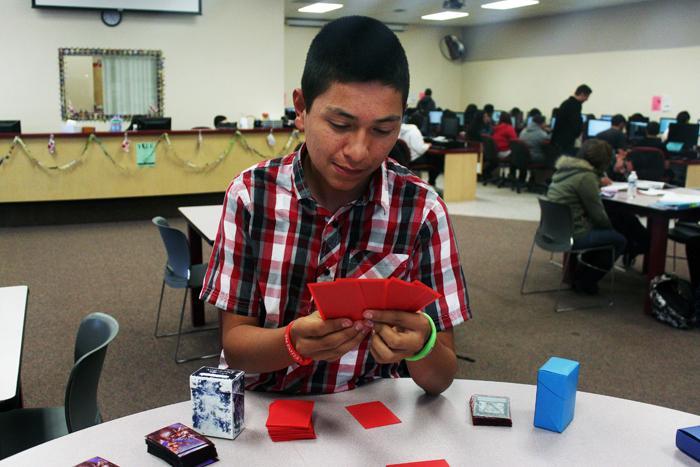Determined to defeat one another for the glory of being named Yu-Gi-Oh champion, players gather in the library every morning and lunch to test their card playing skills, decks, and strategies. Yu-Gi-Oh, a card game based on conjuring mythical monsters in order to deplete the life points of an opponent, gained widespread popularity in the late 90s and early 2000s. The game resonates the strongest with people aged 15-20, given that they matured while the game was at its fervent peak.
The game has a dizzying amount of cards—a fact that both invigorates and frustrates gamers. Regardless of the difficulty of the game, students still gather to duel one another and test their decks. Most agree the fun resides in its challenging nature and rigor. The game requires logic, maneuvering, critical thinking, and intense patience; yet, as much as the previous attributes are requisites for an elite participant, luck always plays a fair amount in any duel.
“You have to work as you go through the game,” senior Marco Antonio Portillo said. “No duel is ever the same, and different players have different strategies—you just never know what will happen.”
Luck is a significant factor for the sole reason that Yu-Gi-Oh is based on drawing cards at random and using them immediately. For instance, if a player has created a solid strategy but the necessary cards to activate their plan do not appear until the end, then they’re more likely to lose. The stakes are two fold; one plays with fate as well as an opponent.
The game is also high-stakes. Players will bet on anything from cards to money—but the most important thing they stake is their pride.
“Every game gives us the ability to have bragging rights,” Erik Ayala said.
The duelists repeatedly hold competitions where the winner could win upwards of 100 dollars. Equally impressive is the amount of money that the players fuel into their decks. Antonion Portillo, for example, has invested around 200 dollars into this game.
“It’s really fun and it makes a lot of money,” sophomore Michael Sourial said. “These cards have serious retail value.”
The noises of the duel are very loud as well. Frequently, one will hear groans and yells of anguish as a very powerful beast is destroyed by a trap or stronger monster. The librarian constantly reminds the small group to quiet down.
The card players are not alone in their desire to leave the realm of realty, for the library also houses the kids who play Mine Craft. Glued to the computer monitors, these youngsters play the computer game with almost a religious zeal.
Every day, these avid gamers can be found building worlds and destroying them; however, they do so with a face that contains excitement and at the same time no perceptible emotion. They are completely and totally plugged into their game.
“I am completely addicted to Mine Craft,” senior Tyler Ayala said. “The game basically revolves around surviving and building and making worlds. You make the world based on a block system, where everything is made out of blocks. So a person would be like two or three blocks.”
Mine Craft allows gamers to explore, build, and destroy, all of which are great creative exercises. The game is also very logic based and tests the skills of those who wish to play.
Last but not least, the Gamers Club, which meets every Monday and Friday, also allows for students to find people like them: people who love and enjoy living through an animated character. Mostly, the gamers club will spend its time going over new games or playing them. The club does not advocate any single type of game, but rather seeks to enjoy all of the fruits of the gaming industry.
An interesting fact, Yu-Gi-Oh currently has more than 5,000 playable cards. Surprisingly, Konami also plans on expanding the amount of cards in the industry. Luckily, starter packets are offered at many gaming stores to help novices enter the world of Yu-Gi-Oh; although the packets are useful, they are renowned for containing weak monsters and poor magic cards. In order to build up a deck, a player must battle others for their cards or purchase powerful boosters. The card boosters, on the downside, can be rather expensive and might not be compatible with a player’s current deck. The Exodia set, for example, offers specialty cards to duelists who prefer a speedy, protective strategy. In addition to the staggering amount of cards, the games also have a motley assortment of rules. Certain cards can only be utilized in very specific situations, and this can become frustrating.
Online tournaments are also held for card gamers. A player’s card can actually be digitally transferred online to help create a feeling of reality.
All around the school there are people who enjoy games. In one extreme, there are those who play physical, games such as sports; in the other, are those who play virtual reality games and exercise their minds, if anything. Whether one falls into one extreme or the other, it is almost an assured fact that a large majority of students can find themselves somewhere in the spectrum.





marco antonio portillo • Apr 2, 2012 at 6:50 PM
Hey nice downey legend I forgot to mention my whole name is marco antonio portillo. I think u also misspelled my name its spells Antonion when it spell antonio